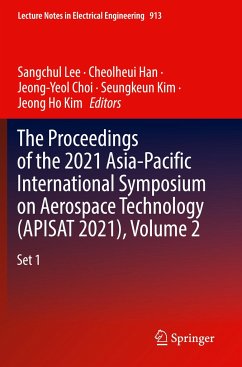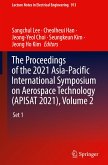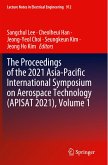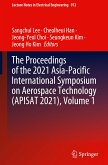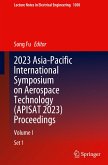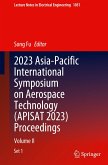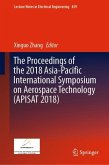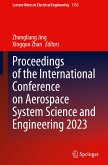The Proceedings of the 2021 Asia-Pacific International Symposium on Aerospace Technology (APISAT 2021), Volume 2
Herausgegeben:Lee, Sangchul; Han, Cheolheui; Choi, Jeong-Yeol; Kim, Seungkeun; Kim, Jeong Ho
The Proceedings of the 2021 Asia-Pacific International Symposium on Aerospace Technology (APISAT 2021), Volume 2
Herausgegeben:Lee, Sangchul; Han, Cheolheui; Choi, Jeong-Yeol; Kim, Seungkeun; Kim, Jeong Ho
- Broschiertes Buch
- Merkliste
- Auf die Merkliste
- Bewerten Bewerten
- Teilen
- Produkt teilen
- Produkterinnerung
- Produkterinnerung
This proceeding comprises peer-reviewed papers of the 2021 Asia-Pacific International Symposium on Aerospace Technology (APISAT 2021), held from 15-17 November 2021 in Jeju, South Korea. This book deals with various themes on computational fluid dynamics, wind tunnel testing, flow visualization, UAV design, flight simulation, satellite attitude control, aeroelasticity and control, combustion analysis, fuel injection, cooling systems, spacecraft propulsion and so forth. So, this book can be very helpful not only for the researchers of universities and academic institutes, but also for the…mehr
Andere Kunden interessierten sich auch für
![The Proceedings of the 2021 Asia-Pacific International Symposium on Aerospace Technology (APISAT 2021), Volume 2 The Proceedings of the 2021 Asia-Pacific International Symposium on Aerospace Technology (APISAT 2021), Volume 2]() The Proceedings of the 2021 Asia-Pacific International Symposium on Aerospace Technology (APISAT 2021), Volume 2242,99 €
The Proceedings of the 2021 Asia-Pacific International Symposium on Aerospace Technology (APISAT 2021), Volume 2242,99 €![The Proceedings of the 2021 Asia-Pacific International Symposium on Aerospace Technology (APISAT 2021), Volume 1 The Proceedings of the 2021 Asia-Pacific International Symposium on Aerospace Technology (APISAT 2021), Volume 1]() The Proceedings of the 2021 Asia-Pacific International Symposium on Aerospace Technology (APISAT 2021), Volume 1292,99 €
The Proceedings of the 2021 Asia-Pacific International Symposium on Aerospace Technology (APISAT 2021), Volume 1292,99 €![The Proceedings of the 2021 Asia-Pacific International Symposium on Aerospace Technology (APISAT 2021), Volume 1 The Proceedings of the 2021 Asia-Pacific International Symposium on Aerospace Technology (APISAT 2021), Volume 1]() The Proceedings of the 2021 Asia-Pacific International Symposium on Aerospace Technology (APISAT 2021), Volume 1292,99 €
The Proceedings of the 2021 Asia-Pacific International Symposium on Aerospace Technology (APISAT 2021), Volume 1292,99 €![2023 Asia-Pacific International Symposium on Aerospace Technology (APISAT 2023) Proceedings 2023 Asia-Pacific International Symposium on Aerospace Technology (APISAT 2023) Proceedings]() 2023 Asia-Pacific International Symposium on Aerospace Technology (APISAT 2023) Proceedings226,99 €
2023 Asia-Pacific International Symposium on Aerospace Technology (APISAT 2023) Proceedings226,99 €![2023 Asia-Pacific International Symposium on Aerospace Technology (APISAT 2023) Proceedings 2023 Asia-Pacific International Symposium on Aerospace Technology (APISAT 2023) Proceedings]() 2023 Asia-Pacific International Symposium on Aerospace Technology (APISAT 2023) Proceedings226,99 €
2023 Asia-Pacific International Symposium on Aerospace Technology (APISAT 2023) Proceedings226,99 €![The Proceedings of the 2018 Asia-Pacific International Symposium on Aerospace Technology (APISAT 2018) The Proceedings of the 2018 Asia-Pacific International Symposium on Aerospace Technology (APISAT 2018)]() The Proceedings of the 2018 Asia-Pacific International Symposium on Aerospace Technology (APISAT 2018)243,99 €
The Proceedings of the 2018 Asia-Pacific International Symposium on Aerospace Technology (APISAT 2018)243,99 €![Proceedings of the International Conference on Aerospace System Science and Engineering 2023 Proceedings of the International Conference on Aerospace System Science and Engineering 2023]() Proceedings of the International Conference on Aerospace System Science and Engineering 2023154,99 €
Proceedings of the International Conference on Aerospace System Science and Engineering 2023154,99 €-
-
-
This proceeding comprises peer-reviewed papers of the 2021 Asia-Pacific International Symposium on Aerospace Technology (APISAT 2021), held from 15-17 November 2021 in Jeju, South Korea. This book deals with various themes on computational fluid dynamics, wind tunnel testing, flow visualization, UAV design, flight simulation, satellite attitude control, aeroelasticity and control, combustion analysis, fuel injection, cooling systems, spacecraft propulsion and so forth. So, this book can be very helpful not only for the researchers of universities and academic institutes, but also for the industry engineers who are interested in the current and future advanced topics in aerospace technology.
Hinweis: Dieser Artikel kann nur an eine deutsche Lieferadresse ausgeliefert werden.
Hinweis: Dieser Artikel kann nur an eine deutsche Lieferadresse ausgeliefert werden.
Produktdetails
- Produktdetails
- Lecture Notes in Electrical Engineering 913
- Verlag: Springer / Springer Nature Singapore / Springer, Berlin
- Artikelnr. des Verlages: 978-981-19-2637-2
- 1st edition 2023
- Seitenzahl: 1476
- Erscheinungstermin: 2. Oktober 2023
- Englisch
- Abmessung: 235mm x 155mm x 79mm
- Gewicht: 2196g
- ISBN-13: 9789811926372
- ISBN-10: 9811926379
- Artikelnr.: 68803962
- Herstellerkennzeichnung Die Herstellerinformationen sind derzeit nicht verfügbar.
- Lecture Notes in Electrical Engineering 913
- Verlag: Springer / Springer Nature Singapore / Springer, Berlin
- Artikelnr. des Verlages: 978-981-19-2637-2
- 1st edition 2023
- Seitenzahl: 1476
- Erscheinungstermin: 2. Oktober 2023
- Englisch
- Abmessung: 235mm x 155mm x 79mm
- Gewicht: 2196g
- ISBN-13: 9789811926372
- ISBN-10: 9811926379
- Artikelnr.: 68803962
- Herstellerkennzeichnung Die Herstellerinformationen sind derzeit nicht verfügbar.
Sangchul Lee received his B.S. and M.S. degrees in Aeronautical Engineering from Seoul National University, Korea, in 1986 and 1988, respectively. He got his Ph.D. degree from Texas A&M University in 1994. Then he worked for Samsung Aerospace Industries, Ltd. and Korea Aerospace Industries, Ltd. from 1994 to 2006. He joined Korea Aerospace University in 2006, currently serving as a professor of the School of Aerospace and Mechanical Engineering. His research interests include flight dynamics and aircraft control, dynamics and control of space structures, avionics system design, system engineering and management, and software engineering. Currently, he is serving as a BK21FOUR program director of Smart Drone Convergence E&R center of Korea Aerospace University. Cheolheui Han graduated from department of Mechanical Engineering of Hanyang University in 1993 and got master and Ph.D. degrees in the same department in 1998 and 2003, respectively. His Ph.D. degree was on the aerodynamic analysis and design of a flying train inside a track utilizing the wing-in-ground effect. While he was a Ph.D. student, in 2000, we worked at the Ocean Engineering Group, Dept. of Civil Engineering, University of Texas at Austin(USA) as a visiting scholar. After graduation, we worked at the Dept. of Aerospace and Ocean Engineering, Virginia Tech(USA) as a visiting postdoctoral researcher. In 2004, he worked at Kengwon Tech as a CFD engineer. After working as a lecture professor at Hanyang University for a year and doing research at Artificial Muscle Center at Konkuk as a research professor, he joined the Aeronautical and Mechanical Design Department of Korea National University of Transportation, Chungju, Korea, in 2006. He is now serving as a professor at the same department. He was included in Marqui's Who's who in the World in 2007. He spent his sabbatical year at the Cavitation Laboratory in the University of Texas at Austin in 2012. His current research interests are unsteady aerodynamics of insect wings and flying birds. He is developing a hybrid method between the boundary integral, vortex, and stochastic methods Jeong-Yeol Choi is a professor of Aerospace Engineering, Pusan National University, Republic of Korea. He received his Ph.D. from the Seoul National University in 1997. His research interests include dynamics of energetics flows, high-pressure combustion, detonation, reaction kinetics, multi-phase/particle flows, and turbulence-chemistry interaction in propulsion systems. He has co-authored more than 140 archival papers and more than 400 conference papers with international colleagues. He is an associate fellow of the AIAA, and his other professional activities include The Combustion Institute, IDERS, KSAS, KSPE, KOSCO, and KSCFE. He served as the program manager of Space R&D of National Research Foundation (NRF) of Korea, planning and evaluation of Space R&D programs including the development ofspace launch vehicle, micro- to GEO satellites, space exploration, and basic space researches sponsored by the Ministry of Science, ICT, Republic of Korea Government. Currently, he is serving as a BK21FOUR program director of DRONE E&R center of Pusan National University. Seungkeun Kim received his B.Sc. degree in Mechanical and Aerospace Engineering from Seoul National University (SNU), Seoul, Korea, in 2002, and then acquired his Ph.D. degree from SNU in 2008. He is currently a professor at the Department of Aerospace Engineering, Chungnam National University, Korea. He was an associate professor and an assistant professor at the same university from 2012 to 2020. He was a visiting scholar at George Washington University at Washington D.C. in 2019. Previously, he was a research fellow and a lecturer at Cranfield University, UK, from 2008 to 2012. He is interested in micro-aerospace systems, aircraft guidance and control, estimation, sensor fusion, fault diagnosis, fault-tolerant control, and decision-making for autonomous systems. Jeong Ho Kim graduated from department of Aerospace Engineering of Seoul National University in 1992, and he got master and Ph.D. degrees in department of Aerospace Engineering at the same university in 1994 and 1999, respectively. His Ph.D. degree was on the parallel computation technique of finite element method for large-scale structural analysis. As soon as he got a Ph.D. degree, he entered the national supercomputing center of Korea Institute of Science and Technology Information (KISTI) as a senior researcher. After nine years' service, he moved to MIDAS IT as a main developer of the commercial finite element analysis software package, midas NFX. He joined Inha University, Incheon, Korea, in 2012, currently serving as a professor of Department of Aerospace Engineering. He was nominated as one of the Finalists of the Gordon Bell Prize in 2003 for his high-performance parallel sparse direct solver forefficient finite element analysis. This sparse solver has been used as the main linear solver for many research and commercial finite element analysis codes. His current research interests are high-performance computing for computational structural mechanics, additive manufacturing for aerospace applications, and machine learning and data mining for structural mechanics.
Gaussian Process-based Feedback Linearization Control for Quad-Tiltrotor.- Analysis of the Lateral-directional Stability of Gliding Peregrine Falcon.- Traffic Navigation for Urban Air Mobility with Reinforcement Learning.- Nonlinear Dynamic Inversion Control for Aircraft with Disturbance Observer based on Gaussian Process Regression.- Distributed 6-DOF Adaptive Control of Multi-Spacecraft Formation Using Scaled Twistors.- High vacuum circumferentially distributed quad mass MEMS gyroscope based on all-silicon process.- Efficient Gain Parameter Selection Approach for Sliding Mode Control with Application to Rotorcraft Trajectory Tracking Control Design.- A Study on Path planning using Bi-directional PQ-RRT* Algorithm and Trajectory Tracking Technique using Incremental Backstepping Control.- Analysis of Wingless eVTOL Dynamics and Design Low-Level Controller.- Visual Semantic Context of Semantically Segmented Aerial Images.- Real-time Optimal Control Using Flight Path Coordinates.- Reference Path Planning for UAVs Formation Flight Based on PH Curve.- An All-silicon Comb-tooth Capacitive MEMS Accelerometer.- Pseudospectral Convex Optimization for Reentry Vehicle Guidance with No-Fly Zone Constraints.- Automatic Ground Collision Avoidance Control and Decision-making of Fighter Base on Deep Reinforcement Learning.- Practical Rules for the Stability Analysis of Flight Control Electrically Actuation System.- Control Allocation Switching Scheme for Fault Tolerant Control of Hexacopter.- 3D Reconstruction by Pretrained Features and Visual-Inertial Odometry.
Gaussian Process-based Feedback Linearization Control for Quad-Tiltrotor.- Analysis of the Lateral-directional Stability of Gliding Peregrine Falcon.- Traffic Navigation for Urban Air Mobility with Reinforcement Learning.- Nonlinear Dynamic Inversion Control for Aircraft with Disturbance Observer based on Gaussian Process Regression.- Distributed 6-DOF Adaptive Control of Multi-Spacecraft Formation Using Scaled Twistors.- High vacuum circumferentially distributed quad mass MEMS gyroscope based on all-silicon process.- Efficient Gain Parameter Selection Approach for Sliding Mode Control with Application to Rotorcraft Trajectory Tracking Control Design.- A Study on Path planning using Bi-directional PQ-RRT* Algorithm and Trajectory Tracking Technique using Incremental Backstepping Control.- Analysis of Wingless eVTOL Dynamics and Design Low-Level Controller.- Visual Semantic Context of Semantically Segmented Aerial Images.- Real-time Optimal Control Using Flight Path Coordinates.- Reference Path Planning for UAVs Formation Flight Based on PH Curve.- An All-silicon Comb-tooth Capacitive MEMS Accelerometer.- Pseudospectral Convex Optimization for Reentry Vehicle Guidance with No-Fly Zone Constraints.- Automatic Ground Collision Avoidance Control and Decision-making of Fighter Base on Deep Reinforcement Learning.- Practical Rules for the Stability Analysis of Flight Control Electrically Actuation System.- Control Allocation Switching Scheme for Fault Tolerant Control of Hexacopter.- 3D Reconstruction by Pretrained Features and Visual-Inertial Odometry.

